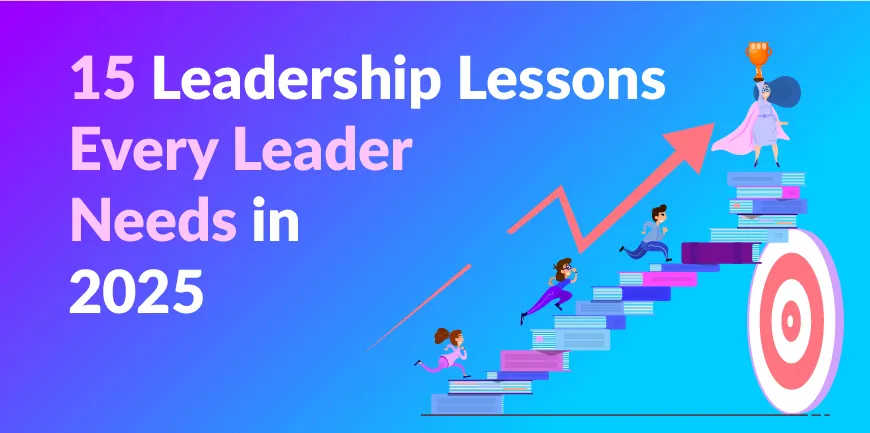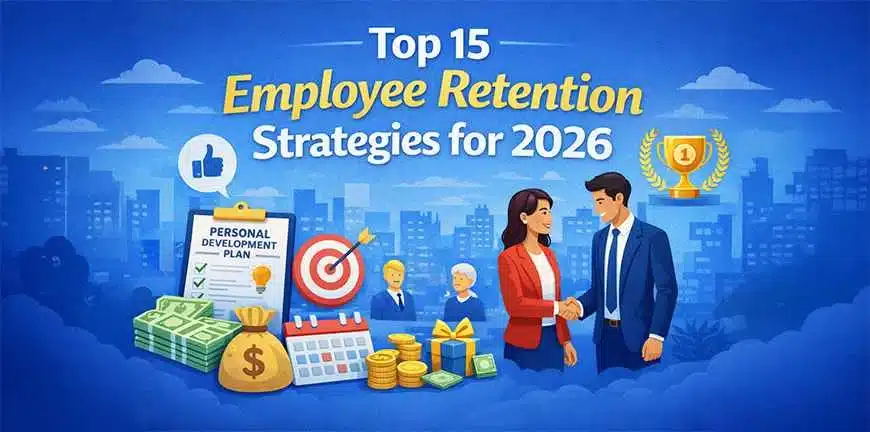
What is Employee Empowerment? Definition, Benefits
24/10/2025
Nearshore vs. Offshore IT Staff Augmentation
25/10/2025- What Are Leadership Lessons?
- Why Leadership Lessons Matter in Today’s Workplace?
- 15 Key Leadership Lessons Essential to Build a Great Workplace
- What are the Practical Applications of Leadership Lessons?
- What are the Common Mistakes Leaders Should Avoid?
- What is the Impact of Leadership Lessons for Future Workplaces?
- Conclusion
- Key Takeaways
- Frequently Asked Questions (FAQs)
“The distance between number one and number two is always leadership. Lead with integrity, and people will follow.”- Indra Nooyi – PepsiCo.
Is your CEO a source of inspiration to achieve bigger things for the organization? Or is there are lack of communication from the leadership team about the company’s future endeavors?
As employees need to grow their abilities and skills to improve their career trajectories, leaders must also embark on a similar journey to ensure they are up and ready to tackle any challenges and take the company forward. Each tough situation and circumstance teaches a new lesson, which can help leaders evolve and become better role models for their employees. Let’s discuss the top 15 effective leadership lessons that every leader must become aware of to create a cohesive work culture that thrives under tough conditions and comes out on top.
What Are Leadership Lessons?
Leadership lessons are practical wisdom that help individuals in leadership positions inspire, guide, and influence an entire workforce effectively. These key leadership lessons act as a fodder for developing essential skills like communication, adaptability, & decision-making.
Let’s take a real-world example that shows how important leadership lessons are for continued business growth. Satya Nadella, CEO of Microsoft, transformed the company by emphasizing empathy and innovation. When he first took the role as CEO, the company was facing stagnation, leading to slow growth & reduced innovation. However, his leadership lessons focused on collaboration and a growth mindset, revived its culture, and accelerated growth. This shows how strong leadership can reshape an entire organization in a short time.
According to Zappia, 77% of companies face a leadership gap, but only 10% of them have structured leadership development programs. This underscores why leadership lessons are paramount for driving long-term success & building future-ready leaders.
Why Leadership Lessons Matter in Today’s Workplace?
Leadership lessons matter more than ever in today’s fast-changing workplace. They shape resilient, empathetic, & innovative leaders who can inspire teams, manage change effectively, & drive sustainable organizational growth. Here are 5 reasons that highlight the importance of leadership lesson activities.
1. Builds Strong & Resilient Teams
Key leadership lessons teach leaders how to foster trust, collaboration, & emotional intelligence and build resilient teams that can thrive during tough times. Strong leadership reduces conflict, enhances morale, & encourages proactive problem-solving. According to Gallup, teams with strong leadership experience 21% higher profitability & 17% higher productivity.
2. Drives Employee Engagement & Retention
Effective leaders inspire employees to stay motivated & committed to shared goals. Leadership lesson plans equip managers to communicate clearly, recognize achievements, & create inclusive cultures. A study by Deloitte found that organizations with effective leadership development see 30% higher employee engagement & 50% lower turnover rates.
3. Enables Adaptation to Change
Modern workplaces face constant transformation through technology, hybrid work, & market shifts. Leadership lessons prepare leaders to guide teams through change with confidence and clarity. According to McKinsey & Company, organizations with strong change leadership are 3.5 times more likely to outperform peers during transitions.
4. Boosts Innovation and Problem-Solving
Leaders who embrace continuous learning inspire creativity & innovative thinking in their teams. Leadership lessons encourage open communication, calculated risk-taking, & idea generation. PwC reports that 79% of CEOs believe leadership development is paramount for driving innovation & competitive advantage in today’s business environment.
5. Strengthens Organizational Culture
Leadership lessons cultivate empathy, integrity, and accountability. These values help in creating a positive workplace culture. When leaders model such inspiring behaviours, they set standards for the entire organization. According to SHRM, 94% of employees say a healthy workplace culture is non-negotiable to business success, & strong leadership is a key driver.
15 Key Leadership Lessons Essential to Build a Great Workplace
Here are 15 important leadership lessons every leader must learn to build a positive workplace:
1. Lead by Example
Leaders who model the behaviour they expect from others build trust and accountability. When employees see integrity & commitment in action, they naturally align themselves with organizational values, fostering a culture of ownership & responsibility.
Example: Indra Nooyi consistently led PepsiCo with a strong work ethic & values-driven decision-making, inspiring employees to imbibe the same way.
2. Communicate with Clarity
Clear and transparent communication eliminates confusion, builds trust, & keeps teams aligned with organizational goals. Moreover, effective leaders ensure everyone understands expectations, timelines, & vision, enabling teams to collaborate efficiently & stay motivated.
Example: Tim Cook emphasizes transparent internal communication at Apple Inc., ensuring teams across the company remain aligned with strategic goals.
3. Empower Others
Empowerment isn’t about control; it’s about building trust. Leaders who delegate responsibility & give employees decision-making power build confidence, encourage innovation, & create a sense of ownership that drives performance and workplace satisfaction.
Example: Richard Branson encourages autonomy at Virgin Group, empowering teams to lead initiatives independently.
4. Embrace Continuous Learning
Great leaders never stop learning and give prime importance to leadership lessons. By seeking new knowledge, skills, and perspectives, they inspire teams to grow along with the organisation. A learning mindset encourages adaptability, innovation, & resilience in fast-changing business environments.
Example: Bill Gates dedicates time weekly to learning, setting a precedent for lifelong education and innovation at Microsoft.
5. Practice Empathy
Empathy allows leaders to understand team members’ emotions, challenges, & motivations. When leaders genuinely listen and respond with care, they build stronger connections, reduce burnout, & create a psychologically safe workplace.
Example: Satya Nadella transformed Microsoft’s culture by prioritizing empathy & inclusivity, which drove innovation and growth.
6. Adapt to Change
Change is inevitable and necessary for growth. Leaders who remain flexible & guide their teams through transitions effectively minimize resistance and uncertainty. Moreover, adaptable leadership fosters resilience & positions organizations to thrive in dynamic markets.
Example: Howard Schultz steered Starbucks through economic downturns with flexible strategies & people-first leadership.
7. Inspire Through Vision
Strong leaders articulate a clear, inspiring vision that gives people purpose. When teams understand the “why” behind their work, they’re more engaged, motivated, & committed to achieving shared goals.
Example: Elon Musk’s bold vision for SpaceX inspired engineers & investors to push the boundaries of space exploration.
8. Encourage Innovation
Key leadership lessons teach the value of experimentation & creative problem-solving. By fostering a safe space to share ideas and take calculated risks, leaders unlock innovation & drive organizational growth.
Example: Sundar Pichai promotes a culture of innovation at Google, encouraging employees to experiment through programs like “20% time.”
9. Make Data-Driven Decisions
Intuition matters, but data builds more credibility. Leaders who base decisions on evidence & insights foster smarter strategies, reduce risks, and earn trust from their teams and stakeholders.
Example: Jeff Bezos built Amazon on data-backed decision-making, driving its growth & customer-first strategies.
10. Be Accountable
True leadership means taking responsibility, not shifting blame. When leaders own their decisions & actions, they create a culture of accountability where everyone feels responsible for outcomes and results.
Example: Mary Barra took full accountability for safety issues at General Motors, strengthening brand trust through transparency.
11. Build Trust and Transparency
Trust is the foundation of any great workplace. Leaders who communicate openly, keep commitments, & act with integrity foster loyalty, engagement, and strong team dynamics.
Example: Warren Buffett is known for his transparent communication with shareholders of Berkshire Hathaway, building long-term trust.
12. Develop Emotional Intelligence
High emotional intelligence helps leaders manage their own emotions & respond effectively to others. This creates stronger relationships, reduces conflict, and boosts collaboration across teams.
Example: Oprah Winfrey’s emotional intelligence has been central to her leadership success & cultural influence worldwide.
13. Recognize and Celebrate Wins
Acknowledging achievements, big or small, motivates employees & reinforces positive behaviour. Additionally, recognition-driven leadership boosts morale, retention, & overall workplace satisfaction.
Example: Tony Hsieh celebrated team wins at Zappos, creating a joyful & loyal workplace culture.
14. Invest in People Development
Strong leaders prioritize coaching, training, and mentoring. By nurturing talent, they not only build future leaders but also create a culture where growth is valued & encouraged.
Example: Sheryl Sandberg championed mentorship & leadership development during her time at Meta Platforms (formerly Facebook).
15. Stay Authentic and Humble
Authentic leaders are approachable, honest, and humble. By embracing their strengths and acknowledging their weaknesses, they build stronger connections and inspire trust across the organization.
Example: Tim Cook’s humble leadership style has helped maintain Apple Inc.’s culture of respect & innovation after Steve Jobs.
What are the Practical Applications of Leadership Lessons?
Here are 5 practical applications of leadership lessons:
1. Enhancing Team Collaboration
Leadership lessons help leaders build trust, communicate effectively, and create an inclusive environment. By applying skills harnessed from key leadership lessons, C-suite executives can break down silos, encourage open dialogue, & foster cross-functional teamwork, leading to faster problem-solving & more innovative outcomes.
2. Driving Organizational Change
Change is the only constant, and important leadership lessons prepare leaders to manage it strategically. Moreover, by guiding teams through transitions with empathy and clarity, leaders minimize resistance, boost adaptability, & ensure smoother implementation of new processes, technologies, or cultural shifts.
3. Improving Decision-Making
Effective leadership styles involve using emotional intelligence, critical thinking, & data-driven insights. Additionally, leaders who diligently engage in leadership lesson activities make more balanced, strategic decisions that align with both organizational goals and employee well-being, reducing risks & improving overall efficiency.
4. Boosting Employee Engagement
When leaders recognize contributions, empower individuals, & model ethical behaviour, engagement rises like never before. Practical application of important leadership lessons builds a workplace where employees feel valued, trusted, & motivated to give their best, resulting in lower turnover and higher productivity.
5. Building Future Leaders
Leadership lessons are not just for current leaders but for nurturing future ones. Through mentoring, coaching, and knowledge-sharing, organizations create a leadership pipeline that ensures long-term sustainability, innovation, and growth across all levels of the business.
What are the Common Mistakes Leaders Should Avoid?
Here are 5 common mistakes leaders must avoid at all times:
1. Micromanaging Teams
Constantly controlling every detail limits creativity, delays decision-making, & damages trust. Additionally, micromanagement signals a lack of confidence in employees, which lowers morale & productivity. Moreover, effective leaders delegate tasks, empower teams, & focus on strategic direction instead of daily execution.
2. Ignoring Employee Feedback
Leaders who dismiss or overlook feedback miss valuable insights & risk disengaging their workforce. Ignored employees feel undervalued and disconnected. Moreover, great leaders actively listen, address concerns, & make meaningful improvements that strengthen trust and team commitment.
3. Lack of Clear Communication
Poor communication creates confusion, misalignment, & builds frustration over time within teams. Without clarity on goals or expectations, performance will drop drastically. Leaders should communicate consistently, transparently, and with purpose to ensure every employee is aligned & motivated toward common objectives.
4. Avoiding Difficult Conversations
Dodging tough discussions about performance, behaviour, or strategy allows problems to escalate. Strong leaders address issues early, communicate with empathy, & focus on solutions. This builds respect, accountability, and creates a healthier workplace culture.
5. Failing to Adapt to Change
Sticking rigidly to old strategies in a dynamic environment weakens organizational agility. Leaders who resist change risk losing competitiveness. Moreover, successful leaders stay flexible, embrace innovation, & guide teams confidently through transitions to ensure long-term growth.
What is the Impact of Leadership Lessons for Future Workplaces?
Leadership lessons play a crucial role in shaping future workplaces by creating adaptive, innovative, and people-first organizations. As technology, hybrid work models, & global competition evolve, leaders must go beyond traditional management.
Strong leadership skills foster trust, collaboration, & continuous learning, helping teams thrive in uncertain environments. Leaders who prioritize empathy, agility, and strategic thinking drive higher engagement, stronger innovation, & long-term growth.
According to Gallup, companies with effective leadership practices are 3.5 times more likely to outperform competitors. By applying key leadership lessons, organizations can build resilient teams, develop future leaders, & create cultures that attract & retain top talent. This makes leadership lesson plans not just beneficial but imperative for sustainable success in tomorrow’s workplaces.
Conclusion
Leadership lessons are the foundation for thriving, future-ready workplaces. By equipping leaders with essential skills like empathy, communication, & adaptability, organizations can build stronger teams and a culture of continuous growth.
To help businesses achieve this, Alp Consulting offers customized leadership management solutions designed to develop impactful leaders, drive engagement, and strengthen organizational performance. Partner with Alp today to build the leaders of tomorrow.
Key Takeaways
- Leadership lessons shape resilient, empathetic, and future-ready leaders.
- Strong leadership boosts team collaboration, engagement, and productivity.
- Avoiding common leadership mistakes builds trust and accountability.
- Practical leadership applications drive innovation and sustainable growth.
- Leadership development is essential to build future-ready workplaces.
Frequently Asked Questions (FAQs)
1. What are the most important leadership lessons for managers?
Effective communication, empathy, adaptability, accountability, & empowering teams are the most important leadership lessons for managers to drive sustainable success.
2. How do leadership lessons improve team performance?
Leadership lesson activities enhance trust, communication, collaboration, & problem-solving, enabling teams to work efficiently, stay motivated, and achieve common goals.
3. Can leadership lessons be learned, or are they innate?
Leadership lessons can be learned via experience, training, & reflection, helping individuals develop essential skills, even without natural leadership traits.
4. What leadership lessons are essential for startups?
Startups need leadership lessons focused on vision, adaptability, clear communication, innovation, trust-building, & quick decision-making for sustainable growth and resilience.
5. How can leaders adapt their lessons to remote work?
Leaders can adapt by improving digital communication, fostering trust, encouraging accountability, maintaining transparency, & building engagement in virtual environments.

Rajkumar Shanmugam
Rajkumar Shanmugam is the Head of HR at ALP Consulting, bringing over 19 years of comprehensive HR leadership experience across India and international markets. His expertise spans talent acquisition, employee relations, performance management, compliance, and HR transformation. Rajkumar has a proven track record of driving people-centric initiatives, enhancing workplace culture, and aligning HR strategy with business goals. With extensive experience in US staffing operations and global mobility, he continues to lead organizational excellence through innovation and employee engagement.




